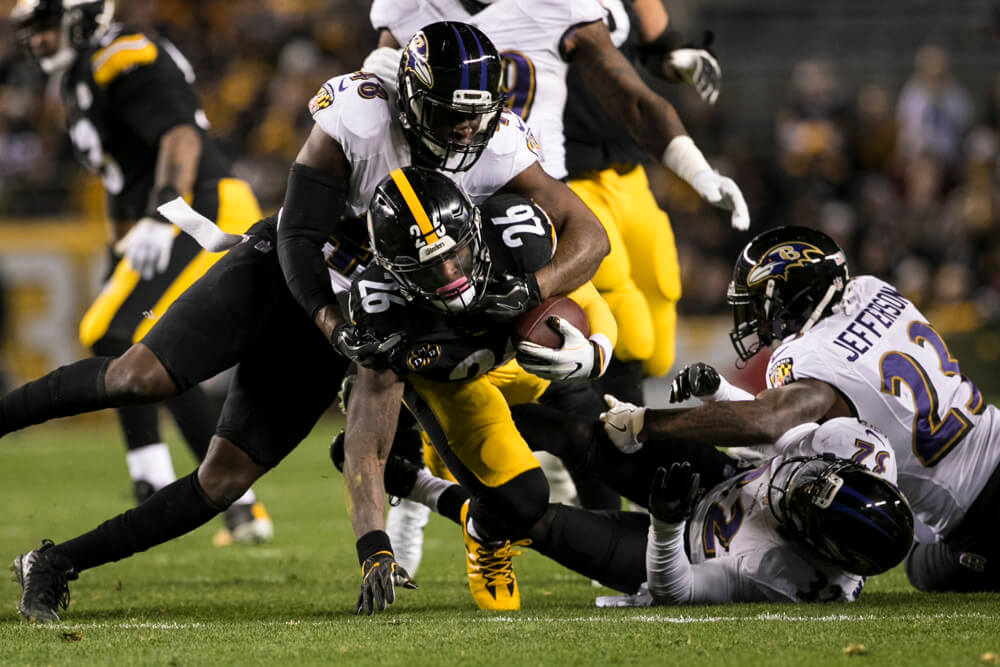The Curse of the NFL Franchise Tag
By Matt McEwan in NFL Football
Updated: March 14, 2018 at 8:56 am EDTPublished:

- How do teams fare when using the franchise tag on a player?
- How do players perform when playing under the franchise tag?
- Which players are likely to be tagged this year?
Just like in any sport or business, hanging onto your top talent is crucial to success. In 1993, the NFL implemented the franchise tag, which aimed to help smaller markets hold onto their stars, reducing player movement to big markets. But the franchise tag does come with a hefty price.
Has the cost been worth the benefit of keeping that player? Before we figure that out, here are a handful of things you’ll need to know about the franchise tag:
- The franchise tag is basically a one-year, fully-guaranteed contract that prevents a player whose contract is expiring from hitting free agency
- The salary is determined by taking the average of the top five salaries at the player’s position for the previous league year; the player could also receive 120-percent of their salary from the previous year, if it’s greater.
- The window to use the franchise tag is from February 20 to March 6
- A franchise tagged player has until July 16 to work out a long-term deal with their team; if no deal is struck, they are forced to play the year out under the tag
- There are 3 different kinds of tags: exclusive, non-exclusive, and transition. The latter two allow the player to negotiate with other teams, as well. The non-exclusive is the most common.
Tracking the Franchise Tag Over the Last 5 Years
Played 2017 Under the Franchise Tag
| Player | Team | 2016 Record | 2017 Record | 2016 Player Stats | 2017 Player Stats |
|---|---|---|---|---|---|
| Kirk Cousins | Washington | 8-7-1 | 7-9 | 97.2 Passer Rtg | 93.9 Passer Rtg |
| Le’Veon Bell | Steelers | 11-5 | 13-3* | 157 YPG | 129.8 YPG |
| Trumaine Johnson | Rams | 4-12 | 11-5** | 80.5 PFF Grade | 74.2 PFF Grade |
*Lost in the Divisional Round of the Playoffs
**Lost in the Wild Card Round of the Playoffs
Chandler Jones (Cardinals), Melvin Ingram (Chargers), Jason Pierre-Paul (Giants), and Kawann Short (Panthers) also received the franchise tag in 2017, but each was able to agree to a long-term deal with their club before the deadline.
Played 2016 Under the Franchise Tag
| Player | Team | 2016 Record | 2017 Record | 2016 Player Stats | 2017 Player Stats |
|---|---|---|---|---|---|
| Alshon Jeffery | Bears | 6-10 | 3-13 | 89.7 Rec YPG | 68.4 Rec YPG |
| Eric Berry | Chiefs | 11-5 | 12-4* | 86.1 PFF Grade | 89.2 PFF Grade |
| Trumaine Johnson | Rams | 7-9 | 4-12 | 80.7 PFF Grade | 80.5 PFF Grade |
| Kirk Cousins | Washington | 9-7 | 8-7-1 | 101.6 Passer Rtg | 97.2 Passer Rtg |
*Lost in the Divisional Round of the Playoffs
Justin Tucker (Ravens), Cordy Glenn (Bills), Von Miller (Broncos), and Muhammad Wilkerson (Jets) were also tagged, but came to an agreement with their respective teams on a long-term deal before the deadline. Josh Norman also had the franchise tag placed on him by the Panthers, but it was rescinded shortly after. Olivier Vernon received the Transition Tag from the Dolphins, but ended up signing with the Giants.
Played 2015 Under the Franchise Tag
| Player | Team | 2016 Record | 2017 Record | 2016 Player Stats | 2017 Player Stats |
|---|---|---|---|---|---|
| Jason Pierre-Paul* | Giants | 6-10 | 6-10 | 12.5 Sacks | 1 Sack |
*Blew his hand up and only played in 8 games
Justin Houston (Chiefs), Demaryius Thomas (Broncos), Dez Bryant (Cowboys), and Stephen Gostkowski (Patriots) were also tagged, but agreed to long-term deals with their respective clubs before the deadline. Charles Clay received the Transition Tag from the Dolphins, but decided to sign with the Bills.
Played 2014 Under the Franchise Tag
| Player | Team | 2016 Record | 2017 Record | 2016 Player Stats | 2017 Player Stats |
|---|---|---|---|---|---|
| Greg Hardy* | Cowboys | 12-4 | 7-8-1 | 15 Sacks | 1 Sack |
| Brian Orakpo** | Washington | 3-13 | 4-12 | 10 Sacks | 0.5 Sacks |
| Jason Worilds*** | Steelers | 8-8 | 11-5**** | 8 Sacks | 7.5 Sacks |
*Put on Commissioner’s Exempt List – only played 1 game
**Only played in 7 games
***Played under the Transition Tag and retired at the end of the season
****Lost in the Wild Card Round of the Playoffs
Jimmy Graham (Saints), Nick Folk (Jets), and Alex Mack (Browns) also received the franchise tag, but reached long-term deals before the deadline.
Played 2013 Under the Franchise Tag
| Player | Team | 2016 Record | 2017 Record | 2016 Player Stats | 2017 Player Stats |
|---|---|---|---|---|---|
| Jairus Byrd | Bills | 6-10 | 6-10 | 92.7 PFF Grade | 88.0 PFF Grade |
| Michael Johnson | Bengals | 10-6 | 11-5* | 11.5 Sacks | 3.5 Sacks |
| Henry Melton** | Bears | 10-6 | 8-8 | 6 Sacks | 0 Sacks |
| Pat McAfee | Colts | 11-5 | 11-5*** | 47.9 Yards Per Punt | 46 Yards Per Punt |
| Randy Starks | Dolphins | 7-9 | 8-8 | 4.5 Sacks | 4 Sacks |
| Branden Albert | Chiefs | 2-14 | 11-5* | No Pro Bowl | Pro Bowl |
| Anthony Spencer**** | Cowboys | 8-8 | 8-8 | 11 Sacks | 0 Sacks |
*Lost in Wild Card Round of the Playoffs
**Tore his ACL after just 3 games
***Lost in Divisional Round of the Playoffs
****Played in just 1 game
Ryan Clady also received the franchise tag from the Broncos, but reached an agreement on a long-term deal.
Franchise Tag Notables From Previous Years
- 2012: Ray Rice was franchise tagged by the Ravens, but the two reached an agreement on a long-term deal before the deadline. Baltimore would go on to defeat the San Francisco 49ers, who had Dashon Goldson playing under the franchise tag, in Super Bowl 47 that season.
- 2010: Ryan Pickett was franchise tagged by the Packers, but they ultimately agreed on a long-term contract before the deadline. Green Bay would go on to defeat the Pittsburgh Steelers, who had kicker Jeff Reed playing under the franchise tag, in Super Bowl 45 that season.
- 2008: The Arizona Cardinals had Karlos Dansby playing under the franchise tag, and lost in Super Bowl 43.
- 2007: The New England Patriots had Asante Samuel playing under the franchise tag, and lost in Super Bowl 42.
Troubling Trends of the Franchise Tag
- Dating back to 2000, no team has ever won the Super Bowl with a player who is playing the season under the franchise tag.
- Teams with an individual playing under the franchise tag have only posted more regular season wins than the previous season in 8 of the 18 instances over the last five years.
- Looking to the last five years, 16 of the 18 players who have gone through the season under the franchise tag posted worse numbers than the previous season – many were significantly worse. The two Chiefs (Eric Berry and Branden Albert) are the exceptions.
- Over the last two years, six of the eight players who originally had the tag placed on them, but came to an agreement on a long-term deal ahead of the deadline, outperformed their previous season.
Franchise Tag Takeaways
While I refuse to deduce that success is impossible when you have a franchise tagged player, it is clear that winning is hard to come by when you have one player eating into so much of your salary cap.
Have a look at the previous five Super Bowl winners:
| Team | Cap Space | Largest Cap Hit | Percentage of Cap | Average Salary of Top 5 at Their Pos. |
|---|---|---|---|---|
| Eagles | $3.77M | $10.75M (Alshon Jeffery) | 6.23% | $15.68M |
| Patriots | $11.9M | $13.7M (Tom Brady) | 9.32% | $19.9M |
| Broncos | $4.97M | $17.5M (Peyton Manning) | 12.06% | $18.54M |
| Patriots | $4.78M | $14.8M (Tom Brady) | 11.02% | $16.19M |
| Seahawks | $4.08M | $11M (Zach Miller) | 8.23% | $5.96M |
You’ll notice that in four of the five situations, the team’s largest cap hit is less than a player at the same position who is franchise tagged. The outlier is the 2013 Seahawks, who could handle one bad contract because they had all of Kam Chancellor, Cliff Avril, Earl Thomas, Bruce Irvin, Bobby Wagner, Golden Tate, Brandon Browner, Russell wilson ($681K), Richard Sherman, and Doug Baldwin counting as less than $4M against the cap. Seattle’s 2010, 2011, and 2012 draft classes were simply incredible.
Championships in the NFL are won by great teams, not just great players.
If you were to add a franchise tagged player (at a position that isn’t TE) to any of these teams, they would have been forced to lose at least one key piece of their Super Bowl winning roster. Championships in the NFL are won by great teams, not just great players.
Players Who Have Received the Franchise Tag in 2018
| Team | Player | Position |
|---|---|---|
| Dolphins | Jarvis Landry | WR |
| Cowboys | Demarcus Lawrence | DE |
| Lions | Ziggy Ansah | DE |
| Rams | Lamarcus Joyner | S |
| Steelers | Le’Veon Bell | RB |
| Bears | Kyle Fuller* | CB |
*Fuller had the transition tag placed on him by the Bears.
Will these teams suffer the same fate as franchise tag-users before them? Follow along in our Super Bowl 53 Odds Tracker.
Odds to Receive the Franchise Tag in 2018
| Team | Player | Position | Odds to be Tagged |
|---|---|---|---|
| Panthers | Graham Gano | K | 1/4 |
| Steelers | RB | 1/3 | |
| Cowboys | DE | 3/7 | |
| Jaguars | Allen Robinson | WR | 2/3 |
| Rams | Sammy Watkins | WR | 4/5 |
| Lions | EDGE | 1/1 | |
| Bears | CB | 5/4 | |
| Seahawks | Sheldon Richardson | DT | 3/1 |
| Panthers | Andrew Norwell | OG | 9/2 |
| Washington | Kirk Cousins* | QB | 7/1 |
| Vikings | Case Keenum | QB | 9/1 |
| Seahawks | Jimmy Graham | TE | 24/1 |
*Played 2017 under the franchise tag
The Carolina Panthers are going to use their franchise tag this season, and it sounds like Graham Gano is the preferred option. The kicker made an NFL-high 96.7-percent of his field goal attempts last season, and was a perfect 10/10 from 40-49 yards.
In spite of Le’Veon Bell’s threat to retire if he received the franchise tag for a second consecutive year, there is no way the Steelers are letting the two-time All-Pro back walk in free agency. If they can’t strike a deal by the March 4 deadline, Pittsburgh will use the tag on Bell again.
After the free agent wide receiver pool just lost Jarvis Landry, Allen Robinson and Sammy Watkins’ value just grew. With both the Rams and Jaguars seen as top contenders for Super Bowl 53, it’s unlikely they let arguably their best receiving threats go.
Minnesota is very hesitant to devote [so] much of their cap to a 30-year-old QB whose career passer rating was 78.4 heading into 2017.
Looking to QBs, there are only two franchise tag candidates this year, since Drew Brees’ previous contract had a clause worked in preventing him from being tagged. Although Washington has no plans of keeping Kirk Cousins (after trading for Alex Smith), he is still more likely to be tagged than Viking pivot Case Keenum. Washington believes they may be able to tag-and-trade Cousins, so they don’t lose him for nothing. Minnesota, on the other hand, is very hesitant to devote that much of their cap to a 30-year-old QB whose career passer rating was 78.4 heading into 2017.

Editor-in-Chief; Sports Betting Expert
With nearly a decade working in the industry, Matt is a seasoned sports betting veteran. He got his start with SBD in 2016 and worked his way up the ladder to become the Editor-in-Chief. Along the way he has done everything from reviewing sportsbooks to creating proprietary sports betting tools.



